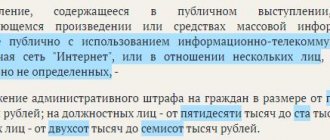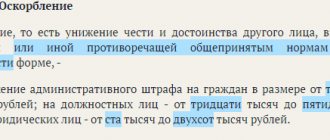Prices for legal services in criminal cases
Insults occupy a significant place in our lives. However, despite the rather serious nature of the infringement of individual rights, such crimes are no longer classified as criminal. Previously, Art. was dedicated to insults. 130 of the Criminal Code of the Russian Federation, but due to the loss of its meaning, the qualification of cases flowed into the mainstream of administrative offenses under Art. 5.61 Code of Administrative Offenses of the Russian Federation.
Today you can often encounter situations where minors are subjected to verbal rudeness. This can happen on the street, at school and even in the family. Both adults and other minors are the guilty parties in the conflict. In this sense, it is important to understand what is considered to be insults, what is the responsibility for committing them, and what does judicial practice say about this?
Insult concept
Insulting a minor is a humiliation of the honor and dignity of a child by offenders (adults or other children). Unlike ordinary conversation in a raised voice, an insult involves an indecent form, a violation of etiquette and social norms. Often this form is expressed in the use of obscene language, from which, alas, not a single modern person is immune. Sometimes attacks involve comparing a child with an animal or object - which in itself is a violation of constitutional norms.
So, the features of insulting a minor are as follows:
- Use of abusive language;
- Suppression of the child’s psychological state;
- Physical impact;
- The presence of direct or indirect threats in speech;
- Other manifestations of rudeness.
Attention! Need a lawyer's protection? in the form, go to the free legal consultation , go, free !
You can often find debates about what can be considered an insult and what cannot? The question is, indeed, quite ambiguous: on the one hand, the offender can show disagreement with the actions of his opponent, point out his mistakes, and express his own opinion, albeit emotionally. On the other hand, even during communication in a raised voice, one should not cross the line of personal hostility towards a person. Therefore, if swear words, incorrect comparisons, or ridiculing the traits of another person are used in a discussion, this can be classified as an attack on honor and dignity.
Insulting children by adults
Sometimes an insult is uttered unconsciously or done for educational purposes to serve as an incentive for self-development. What does the law say in this case? Previously, such offenses fell under Article 130 of the Criminal Code, but it has now been revoked. However, punishment for insulting children remains, although it involves bringing the perpetrators to administrative responsibility. Let us consider the main aspects of such offenses.
Types of insults provided for by law
First, let's look at situations where a child can be insulted. Offensive words may come out of your mouth:
- another child - children often quarrel and tease their peers, not realizing that innocent teasing can cause serious psychological trauma, and constitute an administrative offense;
- teacher - sometimes the teaching staff of schools and preschool institutions allows impartial statements about their students;
- adults - these can be parents and close relatives, strangers who may insult the child in transport or in a store.
Direct insults include the following forms of statement:
- offensive comparison with inanimate objects or animals;
- obscene language addressed to a minor;
- violation of personal space: touching the body or clothing, not necessarily with sexual overtones, but simply unpleasant to the victim.
Important! Any offensive form of address that does not correspond to generally accepted etiquette can be considered an insult.
Legal characteristics
Based on the above, the question arises: how to distinguish a harmless joke from a veiled insult.
To do this, you can refer to the current regulations. It is clearly stated here that insult refers to psychological violence, which is expressed in a negative assessment of the personal qualities of the victim, damaging the victim’s reputation and undermining his self-esteem.
It will not be taken into account if the statements made to the victim are true. In particular, even if a teenager leads an immoral lifestyle, this does not give others the right to evaluate his actions in an offensive or cynical manner.
As an example, we can cite a case from the journalistic practice of the USSR. While reporting about the school, the correspondent gave a personal assessment to one of the students, calling him in the article a big-tongued fat boy. After publication, the nickname stuck and the child was teased for a long time by classmates and acquaintances. Then the case was ignored; now a similar situation is the reason for filing a lawsuit and seeking compensation for moral damage caused.
Composition of the offense
To hold the perpetrator accountable for insult, the offense must have the following qualifying features:
- there is an object of crime - in this situation, this can include the dignity and honor of a teenager, peace of mind;
- subject - any capable (accountable for his actions) citizen over 16 years of age;
- objective side - any actions or gestures aimed at humiliating honor and dignity;
- the subjective side - implies direct intent, that is, the insult is committed consciously.
Important! Not only unflattering statements made orally or in writing are considered insults. Physical actions also fall under this definition: spitting, a slight slap in the face. Such influences do not cause real harm, but they do cause mental pain.
Signs of an offense
Here we understand the fact that insults are always targeted: they are directed towards a specific person, and those around them have no doubt about whom exactly they are talking about.
Types of insult to a minor
Among children and teenagers, personal grievances of minors are always present. Often this manifests itself in relation to physically or mentally weak children, enslaved in behavior, in a word - different from their peers.
Grievances can be represented by:
Personal enmity
Occurs among teenagers whose interests contradict each other. Hostility is usually expressed in verbal rudeness, indecent gestures, ridicule of the opponent’s qualities, etc.
National or religious motives
Humiliation of honor and dignity is accompanied by hostility to the traditions or religion of various faiths. Even if a child behaves appropriately, this may not stop the abusers.
Rudeness on the Internet
Being born into the world of information technology, children can also be harmed by social media. For example, if adults or peers post defamatory information or pictures of an immoral nature online with a hint about the identity of the victim.
Telephone attacks
Calling names, ridicule, rude statements towards a minor via landline or mobile phone.
When faced with the fact of insulting children, you should immediately take action against the offender. Moreover, it is much more effective to punish the guilty person according to the law than to respond to him with rudeness for rudeness. From this point of view, parents must explain to the minor that he is under protection and must correctly assess the situation.
How to prove insult?
A person can be insulted under various circumstances, including by making a telephone call.
How to prove personal insult without witnesses? The question is not easy, since in the absence of witnesses it is quite difficult to prove insult, and the court does not always accept certain evidence of the guilt of the person who insulted the victim. And yet, measures can be taken to record the fact of insult, namely:
- you can turn on the voice recorder and make an audio recording of a conversation with the person insulting you;
- You can also record a video on your phone without focusing on the fact that you are recording your face on video. At the same time, after the insult expressed by the person is recorded, you can, continuing the video recording, inform him that you filmed his fiery speech;
- a conversation between two persons can take place in a place where a video camera is installed that records everything that happens in a particular place, and, accordingly, you can make a request to be provided with a video recording of your conversation with the offender, which will be evidence.
REMEMBER : The court may decide that evidence is inadmissible.
How to prove insult over the phone? You can always install a call recorder on your phone (actually a voice recorder for calls) so that audio recordings of phone conversations are made, i.e., so that your voice and the voice of the caller are recorded. IMPORTANT: periodically delete audio recordings you do not need so that the memory is not full, otherwise the audio recording of the conversation you need may not be saved.
If it is not possible to install a call recorder on your phone, but a witness is present at the time of the conversation, you can turn on the speakerphone so that the witness can hear the words of the person insulting you.
You can also record a telephone conversation with a voice recorder, provided that such a device is sensitive enough and capable of recording the conversation, the caller, or you need to turn on the speakerphone so that the voice recorder is sure to record the caller's voice.
ATTENTION : during a telephone conversation, you must try to establish the identity of the caller and record the date of the conversation, for example, by saying: “And you are calling me today, Sunday, September 22, 2021, to express your insults for an incident that happened in early September?”
Personal insult at work . If a person was insulted at work, then the evidence will depend on the circumstances under which this happened, i.e., if in the presence of other employees, then witness testimony will be used as evidence; if video cameras are installed, the evidence will be video recording; You can also take your own measures to record the insult using the above methods.
In the case where the insult is written on paper, the proof will be a corresponding note with the handwriting of the offender.
ATTENTION: watch the video and you will find out why clients decide to contact us
Responsibility for insulting a child
Starting to consider penalties for persons who have offended minors, we note that the law does not have a separate article for these cases. Offenses are classified under General Art. 5.61 Code of Administrative Offenses of the Russian Federation.
Administrative penalties:
Humiliation of honor and dignity without aggravating circumstances:
- Fine for ordinary citizens - up to 3 thousand rubles;
- Officials (for example, a school teacher) – up to 30 thousand rubles;
- Legal entities – up to 100 thousand rubles.
The presence of aggravating circumstances, for example, public slander or publication of defamatory information in the media, is punishable by:
- Imposing a fine on citizens from 3 to 50 thousand rubles;
- Officials will have to pay from 30 to 50 thousand rubles;
- Gross attacks by organizations will cost them a fine of 100 to 500 thousand rubles.
Thus, it is clearly seen that offending a minor is punishable by a fine. As judicial practice shows, the percentage of such cases in the total volume of proceedings is not very high. This is due to the fact that the courts are reluctant to consider claims under Art. 5.61 Code of Administrative Offenses of the Russian Federation.
Basic terms, legal characteristics of the issue
I would like to say right away that there is no special article regarding insulting a child in Russian legislation, however, some actions on the part of adults are assessed as a qualifying criterion.
Interesting! Previously, to consider cases related to the abuse of children, the common article of the Criminal Code, number 130, was used. Today it has lost force.
The question arises, what article for insulting a minor is used now? The Code of Administrative Offences, namely Article 5.61, allows us to restore justice. According to this article, humiliation of the dignity and honor of a child/teenager is usually called an insult. We are talking about actions on the part of the offender, expressed in an offensive form, which means their non-compliance with generally accepted norms and etiquette:
- according to sociologists, comparing a person with an animal or an object is considered an insult;
- This also includes unpleasant and sometimes even offensive touching of the human body and clothing. This is especially true for situations involving nudity;
- rudeness, swearing, obscene language - all this is also an insult to the individual.
What to do if a minor is abused?
If you witness an adult or other children insulting a child, there is no need to shelve the matter. A complaint should be filed if verbal abuse has seriously damaged the mental state of a minor or affected his social status.
You can file a complaint at the nearest police station, prosecutor's office or directly to the court. Evidence is attached to the complaint. They may be of the following nature:
- Testimony (classmates, parents, neighbors, other eyewitnesses);
- Physical evidence (photo, audio, video);
- Written evidence (notes, threatening letters);
- Other materials (torn clothes, injuries).
In addition to the collected evidence, it will be necessary to convince the court that the minor suffered serious moral harm, lost his reputation in society and was under stress for a long time. If the case is won in the magistrate's court, the plaintiff may also recover moral compensation and legal costs from the offender.
Author of the article
Dmitry Leonov
Work experience 15 years, specialization - housing, family, inheritance, land, criminal cases.
Author's rating
721
Articles written
712
about the author
Useful information on criminal cases
- Prosecution for libel
- Article for libel on the Internet
- False report of rape
- Defense against libel
- Charge of libel
- Theft accusation without evidence
- Sue for personal insult
- Personal insult complaint
- Fine for libel
- Liability for slander of an official
- Violent actions - Article 132 of the Criminal Code of the Russian Federation
- If the boss yells and humiliates: where to complain?
- Insulting a minor child: article
- Neighbor threatens violence: what to do
- Responsibility for violation of confidentiality of correspondence
- Libel lawsuit
- Punishment for public insult to a person
- Does a teacher have the right to insult a student?
- Infringement of the rights of minor children
- Attempted rape
- Blackmail on the Internet - Article 163 of the Criminal Code of the Russian Federation
- Rape charge
- Responsibility for non-payment of wages
- Criminal liability for violation of privacy
- What to do if you receive threats over the phone
- Punishment for knowingly false testimony
- Sample statement about threat to life
- Insulting a police officer while on duty
What should parents do if their child is being bullied at school?
Unfortunately, child cruelty can be extremely sophisticated and terrible. You need to deal with it using adult methods - a lawyer and a psychologist tell you what to do if your child is faced with bullying from peers.
Rolan Bykov opened the eyes of many parents and students by filming the famous film “Scarecrow” with Kristina Orbakaite in the title role. This is the story of a girl, Lena Bessoltseva, who constantly suffers bullying from her classmates. The guys even perform a ritual called “Crucifixion of the Scarecrow.” Lena's dress is put on a scarecrow and then burned with the words “The scarecrow is a traitor.” Only this film still has a good ending. The Bessoltsevs leave the city, and on the chalkboard the guys write: “Scarecrow, forgive us!” Today, teenagers have become more cruel, and bullying (literal translation - bullying) is becoming a serious problem that psychologists no longer talk about, but shout about.
“At 30 years old, we can easily laugh in the eyes of the offender. At the age of 14, everything is perceived differently, and the nickname Pinocchio offends and hurts. In my practice, there was a case when classmates brought a schoolgirl to a nervous breakdown because of the girl’s large breasts: they said that she was putting cotton wool in her bra. The story ended with a change of school, long-term work with a psychologist.”
Any teenager can become a victim of bullying. The object of ridicule and bullying is not only a shy nerd, but also an active student, a fighter for justice.
“They always boycott those who stand out from the crowd,” continues the psychologist. “They will bully not only a girl from a poor family who wears her mother’s old coat and doesn’t use deodorant, but also an unusually dressed schoolgirl with pink hair and a nose ring.” They arrange a dark place for teachers’ favorites, sneaks, but at the same time they don’t like honest and talented people.”
It’s more difficult with aggressors.
“Monsters can be raised by parents who are used to humiliating and punishing children,” says the psychologist. “Often a bully becomes the one who is the victim in the family and suffers bullying from elders. Single teenagers, deprived of attention from adults, can become aggressors. The child feels useless, resentment and anger accumulate, which he then takes out on other children.”
According to the psychologist, the scheme of any bullying is similar and simple.
“What is most important to an aggressor is the reaction of the victim,” says the psychologist. - You cannot show your strength over those who are not afraid and do not notice you. But the child does not always have the strength to fight and ignore the tyrant. You can’t do it without the help of adults.”
Legitimate fight
When we talk about bullying, it always means bullying at school.
“Let’s figure out what legal liability exists for a teenager bullying his peer,” comments lawyer and family law specialist Irina Volkova. — It is clear that from the age of 16 you will have to answer to the law as an adult. Often the aggressors are those who are 14 or younger. From the age of 14, a teenager becomes personally responsible only for certain points of the Criminal Code. But when the child is not yet 14 years old, the parents bear full responsibility for the actions of the children.”
If the father and mother of a bully clearly fail to fulfill their responsibilities, they can be prosecuted under the article “Failure of parents or other legal representatives of minors to fulfill their duties for the maintenance and upbringing of minors.” But to go to court, you need to have a good evidence base: screenshots of all threatening correspondence (it is advisable to have them certified by a notary), witness statements, certificates of beatings, photos of damaged personal belongings. It’s good if there is a voice recorder. Please note: the recording device must be of domestic production.
Still, the lawyer advises trying to avoid legal proceedings, because in reality the only punishment for a minor is for the parents to pay fines (100-200 thousand rubles) and to register a difficult teenager with the police.
“Before you run to lawyers, try to influence the child tyrant through school,” the lawyer continues. - Start with a conversation with the class teacher. If he doesn’t respond, write a complaint to the school principal.”
If there is no reaction from the director, write three statements at once:
- to the commission on juvenile affairs, which is located in the district government;
- to the school council;
- inspector for juvenile affairs.
If these authorities ignore your appeal, then submit applications higher: to the prosecutor’s office, the department of education, and the ombudsman for children’s rights.
“It is advisable to talk about the incident in the media to attract the public. The most important thing is that you should always be close to your child,” adds Irina Volkova.
Real experience
A working case was described on her Facebook page by one of the mothers whose child was bullied by classmates with the full connivance of the teachers - they pretended that nothing was happening. Natalya Tsymbalenko collected all the evidence she could of the outrages happening at school. First, I talked to the class teacher and the parents of the offenders. This led to nothing but a series of insults, but my mother was ready for this. Then she wrote a statement demanding that the situation be sorted out to the school director. I made copies - sent one to the address of the chairman of the school’s Governing Council, and took the other to the Administration of my district in the Commission on Minors’ Affairs.
“I wrote down the numbers of incoming documents,” Natalya clarifies.
Then she wrote a post on social networks. The parents of Natalya’s son’s offenders still refused to make contact: “We’ll meet in court!” But at that moment the school began to stir.
“First, the chairman of the governing council asked me an obvious question: “Don’t you want to take your son?” I honestly forbade even offering me such advice - we will look into this case with my son to the end, and we will also write a memo with the school on the topic of bullying. The process has begun,” writes Natalya.
The juvenile affairs inspectorate came to the school. There were conversations with both children and parents of particularly aggressive schoolchildren. One particularly distinguished person was registered. They apologized to the mother and her son.
Natalya admits: it was not easy. Her son was very scared, especially since at first the aggression against him intensified and there were serious threats.
“I called at every break, my husband picked Petya up from school. I also promised to hire them a bodyguard if the threats became even remotely realistic. But the more activity the school developed (meetings, conversations), the more the class realized that this was all serious. And he calmed down,” says the desperate mother. And he summarizes: “Not a single bullying, not a single persecution will end until adults, third forces, intervene in it. Until the bullies understand and take full responsibility. Therefore, involve the school, the education department, the police, the prosecutor’s office.”
Insult lawyer in Yekaterinburg
Consulting an administrative law lawyer will give you the answer. Situations often occur in life when you really want to respond to an insult or punish another person for it.
But in this situation, you need to be guided by the law, not your fists. Knowledge of Russian legislation is necessary in order to be able to teach the offender a “lesson” using the legal method. The question of whether it is possible to punish a person for an insult worries many people. Let's solve it with the help of an insult lawyer from the Law Office "Katsailidi and Partners" today!









